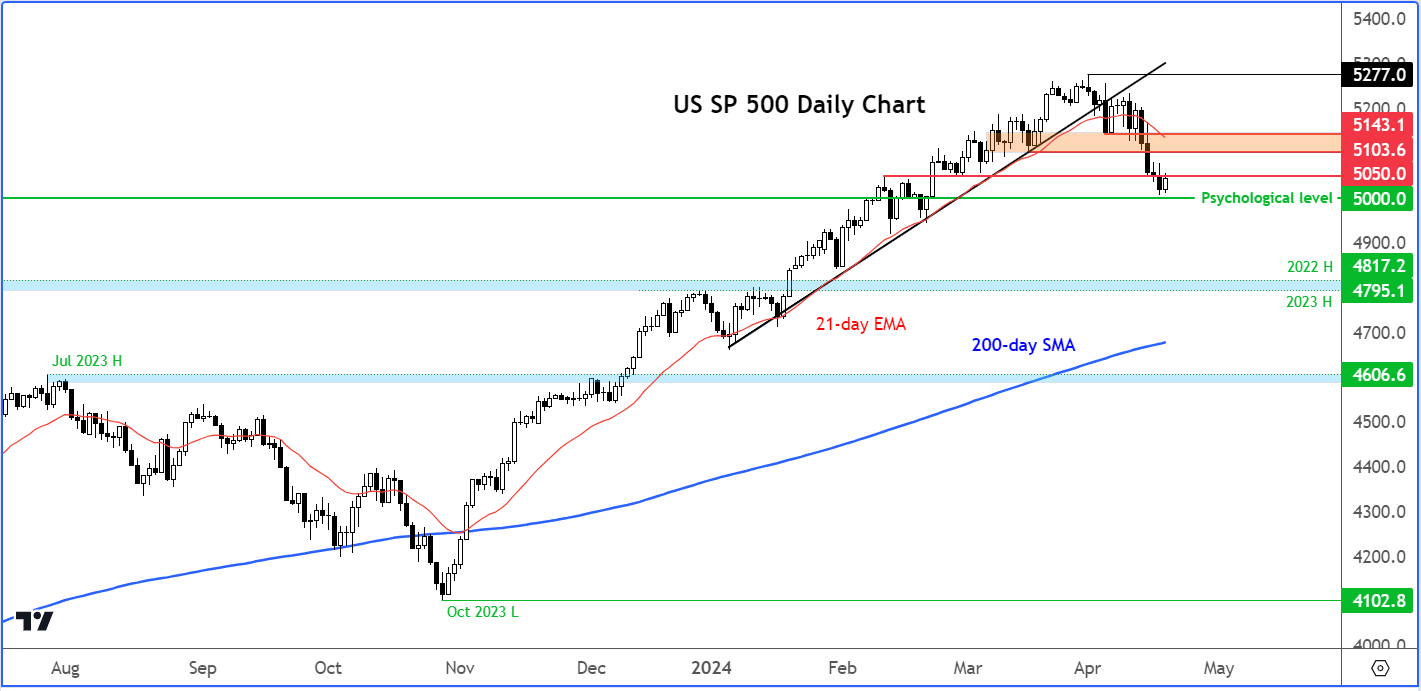
- S&P analysis: Investors relying on earnings to provide boost, starting with Netflix
- Market strain in Q2 amid interest rate uncertainty and raised geopolitical risks
- S&P 500 analysis: Technical levels and factors to watch
Similar to the day before, European equities made a modest recovery, contributing to a slight uptick in US index futures and then a positive start to the trading day once Wall Street opened. Despite a lack of positive developments to ease investor anxiety, there may have been some reassurance in Israel's primarily diplomatic response thus far to the situation concerning Iran. However, the possibility of alternative actions remains, amidst global calls for restraint to prevent escalation in the Middle East. While optimism in Europe on Wednesday was driven by favourable earnings reports, today's market rally lacked significant company news. Attention is now focused on earnings reports from major tech companies like Netflix. Nonetheless, similar to Wednesday, early gains may fade as we head deeper into the US session. This is because the existing macroeconomic concerns remain, with bond yields again on the rise – this time boosted by better-than-expected jobless claims and Philly Fed index.
The recent stock market downturn has been driven mainly because of worries about global interest rates remaining high for long, which were exacerbated on Wednesday by lower-than-expected UK inflation figures. Several Federal Reserve officials, including Chairman Powell, have expressed growing concerns about inflation, fuelling concerns that we may see a more hawkish stance on interest rates again. Geopolitical tensions in the Middle East have also weighed heavily on investor sentiment lately. Consequently, while strong corporate earnings provide some uplift, the overall macroeconomic outlook for stocks remains subdued.
S&P analysis: Investors relying on earnings to provide boost, starting with Netflix
Consequently, any prospect of market rebound now hinges significantly on corporate earnings. This was evident on Wednesday as positive earnings in Europe lifted the indices, if only temporarily. Will we see more forecast-beating earnings as we head deeper into the earnings season? If so, this is something that could help alleviate pressure on the indices.
The earnings season for major US tech companies is set to begin, commencing with Netflix after the close, which will unveil its results after market close. While Netflix no longer offers guidance on subscriber growth, the uptick in user numbers remains a pivotal metric for its earnings report. It remains to be seen whether the company's performance will validate the stock's recent strong performance.
Market strain in Q2 amid interest rate uncertainty and raised geopolitical risks
So, question remains whether this recovery will spark a rally or merely represent a temporary bounce, akin to recent days.
Both US and global stock indices have fallen out of favour in recent weeks, as investors exhibit hesitancy towards risk-taking. This was hardly surprising as they took profit ahead of earnings season and particularly following the record-breaking performance witnessed in the five months leading up to April.
The primary concern for investors is the escalating tensions in the Middle East, with Israel seeking retaliation for Iran's recent attacks on Saturday, creating added uncertainty.
Furthermore, investors are growing increasingly apprehensive about the rising yields on benchmark government bonds, as the possibility of a June rate cut by the Fed diminishes. Initially, traders had priced in approximately six rate cuts for 2024, but uncertainty now looms over the likelihood of even receiving a 50 basis point cut by December.
The mounting government debt and its associated financing costs are significant concerns for investors, which explains the upward trajectory of gold prices despite the higher yields. The International Monetary Fund voiced criticism on Tuesday towards US policymakers for adopting unsustainable fiscal policies, which, while contributing to the nation's recent economic success, could lead to inflation and global financial instability if left unchecked.
These macroeconomic factors, coupled with profit-taking by investors, have caused major indices to breach key technical levels, much to the satisfaction of bearish investors.
S&P 500 analysis: Technical levels and factors to watch

Source: TradingView.com
After reaching multiple new all-time highs, the S&P 500 is now in its third consecutive week of declines. On Monday, the index breached a crucial support zone ranging from 5103 to 5143, which had previously served as a support level. Though it has bounced back today, the short-term path of least resistance remains to the downside. So from here, there's a possibility that the index may decline further towards the psychologically significant level of 5000.
If the selling continues beyond the 5K level, then we may have to start looking at even longer-term levels to see where the next support is likely to be. One interesting area to monitor, should we get there, is between 4795 to 4817, corresponding to the highs observed in the preceding two years.
On the upside, the first level of resistance was being tested at the time of writing around the 5050/5 area. The sellers will want to defend this level, else we could see a recovery towards the next key resistance area within the previously breached support range of 5103 to 5143. A close above this range is necessary to restore the bullish sentiment.
-- Written by Fawad Razaqzada, Market Analyst
Follow Fawad on Twitter @Trader_F_R




